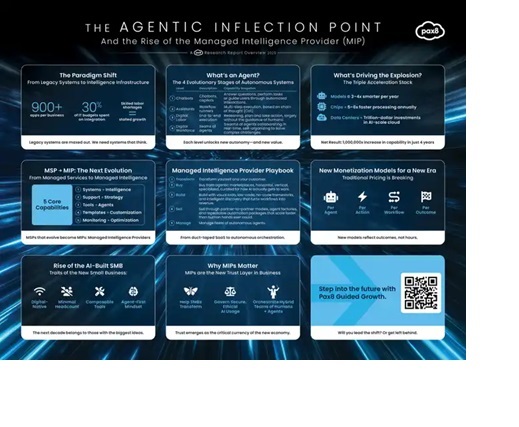You can’t go to a channel conference, read an analyst report or talk to a consultant these days without learning about agentic AI.
Pax8 Beyond last week could have been renamed PaxAI Beyond, as it focused largely on concepts detailed in the cloud marketplace’s report "The Agentic Inflection Point: And the Rise of the Managed Service Provider." Databricks did have AI in its conference name, and the Databricks Data + AI Summit featured a slew of new agentic and other AI products from Databricks and partners.
Cloud provider Rackspace released its 2025 Global AI report showing how IT leaders who embrace agents and other types of AI are “pulling away from the pack.” Agentic AI was also a main topic at Gartner’s Security & Risk Management Summit last week, Forrester picked agentic AI as the No. 1 emerging technology for 2025 and Canalys calls agentic AI the largest growth opportunity in tech for partners over the next three to five years, forecasting $158 billion in services revenue by 2028. The latest episode of McKinsey Talks Operations, covered what the consultant firm calls “the next chapter of AI—agentic AI.”
It's not all happy talk about agentic AI either. We’ve seen warnings about this rapidly emerging technology, such as those in Fast Company, Harvard Business Review and our guest blogger Kevin McDonald in recent weeks.
PAX8 Highlights MIPs for MSPs
In its agentic AI report, Pax8 predicts managed intelligence providers (MIPs) will play a major role in the future of MSPs and make AI a dominant economic force.
“We are standing at the edge of a monumental new era where agentic systems will redefine how work gets done,” Pax8 CEO Scott Chasin said. “The proliferation of these AI agents will allow SMBs to compete against large enterprises and scale faster than ever, and Managed Intelligence Providers will be key to enabling the technology. The rate at which this technology is advancing makes the next 24 to 36 months critical. MSPs that evolve quickly into the MIP model will be poised to experience long-term success in the new paradigm.”
The Pax8 report explores the emergence of agentic AI systems capable of autonomous action and reasoning and their impact on SMBs. It positions the MIP as the next step in AI for MSPs as we already see agentic AI bringing autonomous software agents into collaboration with humans to redefine business operations. Pax8 identifies four levels of agents: chatbots, assistants, digital labor and digital workforce. Chatbots respond to human prompts, assistants make decisions based on contextual information, digital labor agents operate independently across systems with minimal human interaction and the digital workforce is a coordinated systems of agents working together to accomplish complex objectives.
A survey of 66 Pax8 partners indicates 54% of midsize enterprises have already deployed AI, and 83% of high-growth SMBs are experimenting with it. Pax8 predicts the rise of the “AI-Built SMB” that is AI-native from the beginning and will embed generative and agentic technologies into all their operations.
Pax8 said it is building an agent marketplace, a Model Context Protocol integration framework, an agentic orchestration platform, a Managed Intelligence toolkit and more.

Agentic AI Brings Opportunity and Risk
Of course, Pax8 faces significant competition among marketplaces and vendors positioning themselves in the agentic AI space. Canalys projects a remarkable 59.3% compound annual growth rate (CAGR) for this sector over the next four years.
According to Rackspace’s global survey of 1,420 technology decision makers, 77% of those who Rackspace identifies as IT leaders have AI agents in production and are increasing deployment. “Leaders see AI agents not just as tools, but as collaborators that are capable of contributing meaningfully to team goals,” according to the Rackspace report. “In this model, AI takes on high-volume, rules-based tasks, while employees focus on strategy, creativity and decision-making. It’s not just about automation — it’s about unlocking human potential.”
But as Forrester’s Brian Hopkins writes, agentic AI opens both new possibilities and risks for enterprises.
“A new wave of architectures and orchestration tools is making AI agents significantly more flexible and capable — but also more unpredictable. … Clear boundaries, governance, and trust frameworks must evolve alongside the tech,” Hopkins wrote.
